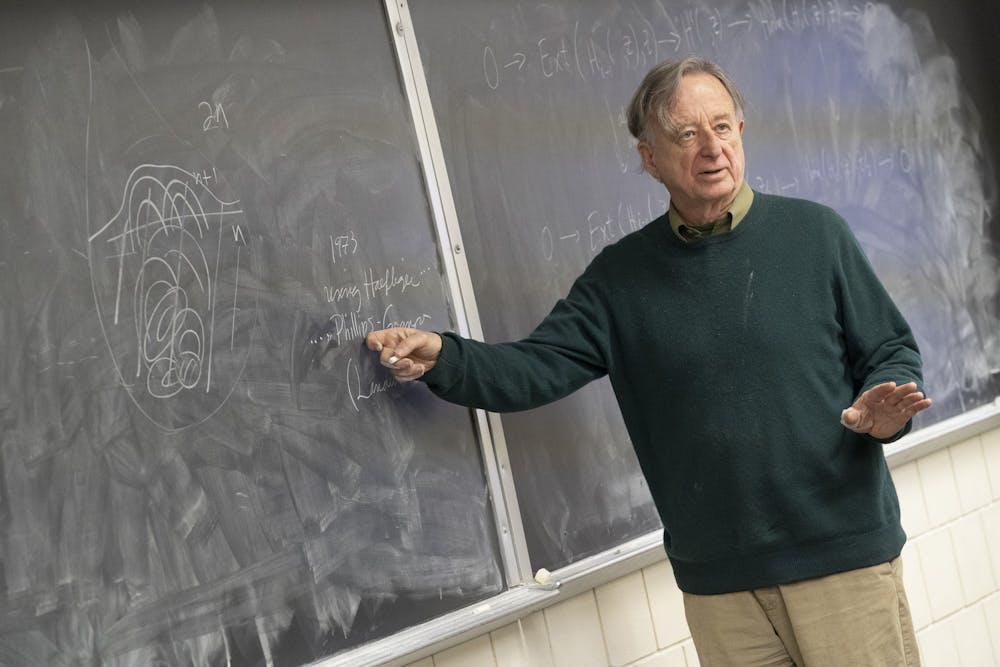Acclaimed mathematician Dennis Parnell Sullivan GS ’66 was awarded the 2022 Abel Prize. One of the highest honors that can be bestowed upon a research mathematician, the honor is considered the equivalent of a Nobel Prize in the field of mathematics.
Sullivan’s honor marks the fifth consecutive year in which the Abel Prize has been awarded to an individual affiliated with the University. Presently, 10 out of the 25 Abel Prize laureates in total are Princeton affiliates.
The Abel Committee, consisting of five mathematicians from around the world, selected Sullivan “for his groundbreaking contributions to topology in its broadest sense, and in particular its algebraic, geometric and dynamical aspects,” according to the announcement.
The Abel Prize was established in 2002 by the government of Norway and has been awarded each year since 2003 by the Norwegian Academy of Science and Letters. The prize is accompanied by a sum of 7.5 million Norwegian kroner, or approximately $860,000, to be funded by the Norwegian government.
Sullivan stated in an interview with The Daily Princetonian that he spent eight years on solving what he said was arguably the most difficult problem of his career: the universality of the period-doubling cascade, a problem discovered by physicists performing computational research on dynamical systems in the 1970s.
Sullivan recalled learning from Princeton mathematicians such as his advisor William Browder GS ’58, Norman Steenrod, and Solomon Lefschetz as a graduate student in the 1960s and how that experience aided him in his research career.
“I was at the right place at the right time with the right interest,” Sullivan remarked. “In the 1970s, things split. The geometry went off in one direction while the algebra went off in another. I went off in a third direction, dynamics, but I still had this understanding of both the geometric part and the algebraic part, and that has always been very useful. So, Princeton was great.”
Sullivan is a distinguished professor in the College of Arts and Sciences at the State University of New York at Stony Brook and the Albert Einstein Chair in Science at the Graduate Center of the City University of New York (CUNY).

Born in Port Huron, Mich., in 1941, Sullivan graduated with a B.A. in mathematics from Rice University in 1963 before entering Princeton for graduate studies in mathematics.
He initially intended to study chemical engineering as an undergraduate before he was pulled into mathematics after observing a professor’s demonstration of a theorem in topology.
After completing his doctorate at Princeton, Sullivan worked through a series of fellowships at the University of Warwick in England, the University of California, Berkeley, and the Massachusetts Institute of Technology.
Sullivan spent one year as professeur associé at the University of Paris-Orsay and became a permanent professor in 1974 at the Institut des Hautes Études Scientifiques (IHÉS) in France.

He became a faculty member at the CUNY Graduate Center in 1981 and simultaneously worked in the United States and France until he left IHÉS for Stony Brook in 1996.
He received his Ph.D. in mathematics from Princeton in 1966 after completing a doctoral dissertation, titled “Triangulating homotopy equivalences,” under the supervision of Browder.
Browder shared his praise for Sullivan in an email to the ‘Prince.’
“Dennis was a member of my first group of graduate advisees on joining the Princeton faculty, and even among this stellar group, Dennis stood out, larger than life, stepping farther, grinding harder, and an intellectual vacuum cleaner always at high power,” Browder wrote. “His thesis made a great contribution to our subject, and he has been high flying ever since.”
Sullivan’s Abel Prize comes for his groundbreaking contributions to the fields of topology and dynamical systems, which can be linked back to his graduate studies at Princeton.
Sullivan’s Ph.D. thesis built on the work of Browder and Russian mathematician Sergei Novikov and dealt with the classification of manifolds: a class of fundamental mathematical objects that appear to be flat when observed from a single point on their surface, but possess a much more complex global geometry in reality.
Sullivan’s work on the classification of manifolds in five or more dimensions greatly accelerated the development of surgery theory, which is an innovative set of techniques used to transform one manifold into another.
Sullivan’s interest in manifolds and topology helped him make contributions in unexpected areas and make unexpected connections; the prize citation called him a “true virtuoso” for developing deep insights in various fields.
John Milnor ’51 GS ’54, a fellow mathematician at Stony Brook who received the Abel Prize in 2011, met Sullivan while the latter was a graduate student at Princeton. He reflected on his experiences of learning from Sullivan over decades.
“He is a wonderful mathematician, full of ideas and is very good at talking to people and explaining his ideas,” Milnor told the ‘Prince.’ “We both wandered from subject to subject. Actually, even though I’m 10 years older than him, I think I’ve learned much more from him than he has learned from me because he was working much earlier on areas that I later became interested in.”
Sullivan’s numerous other honors include the 1993 King Faisal International Prize for Science, the 2005 U.S. National Medal of Science, and the 2010 Wolf Prize in Mathematics. He was elected as a member of the National Academy of Sciences in 1983 and a member of the American Academy of Arts and Sciences in 1991.
Sullivan will be presented with the Abel Prize by King Harald V of Norway in a ceremony in Oslo on May 24.
Allan Shen is a senior writer who often covers research and obituaries. He can be reached at fuluns@princeton.edu, or on Twitter at @fulunallanshen. He previously served as an Associate News Editor.








